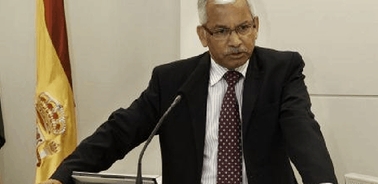- Home
- News And Events
- What’s Going On
- Rajeev Kher, Secretary General Of India´s Ministry Of Commerce, At Ie Business School
Rajeev Kher, Secretary General of India´s Ministry of Commerce, at IE Business School

On May 13 Rajeev Kher, Secretary General of India´s Ministry of Commerce, took part in the opening workshop of IE Business School’s International Commerce Club.
During a debate with students from IE’s Master in Management and International MBA programs, Rajeev Kher examined the key challenges facing India in the current international economic climate, and the importance of diversification and of opening new markets to drive growth in India.
“To diversify is an inherent and intrinsic necessity to continue growing”, Kher explained, while also reminding his audience of the need to increase export of services and facilitate business. Kher also explained how in the near future, agreements planned by the World Trade Organization will develop into a set of basic, limited rules. He underscored the fact that there is a greater focus on other agreements with the expansion of the Trans-Pacific Partnership which is set to admit eight further countries from the Latin America region and South East Asia, and the Trans-Atlantic Trade & Investment Partnership that is expected to take place between the US and the EU.
According to Kher these movements will build a club comprised of 40 “have” countries, while the other nations will remain as “have nots”. “Everyone wants to be in the “have” Club,” he said, “as they have 43% of global trade. Nobody wants to be in the “have not” club”. He added that this would oblige the other countries to bring their regulations and standards up to the same level as the 40 “have” countries. This would not be possible for most developing countries in the short run. Therefore, they must find new strategies to pursue their global trade interests. One such approach could be to take a fresh look at trade among the BRICS countries and a new set of emerging economies often referred as N-10 which includes countries such as Indonesia, Turkey, Mexico, Nigeria, etc. He emphasized that there is a potential in exploring a plurilateral approach to trade among this new set of countries most of whom may not be members of the mega agreements being negotiated.
The workshop was rounded off with questions from the students about issues like key trade interests between India and Latin America, relations with Russia in the pharmaceutical industry, anti-dumping laws, and trade agreements with Africa.